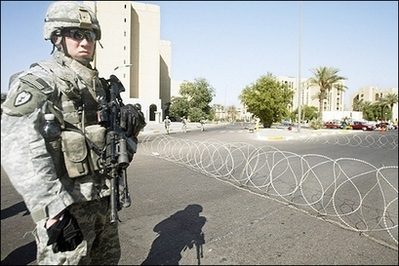Report puts hidden war costs at $1.6T
Updated: 2007-11-14 07:02
WASHINGTON -- The economic costs of the wars in Iraq and Afghanistan are estimated to total $1.6 trillion -- roughly double the amount the White House has requested thus far, according to a new report by Democrats on Congress' Joint Economic Committee.
|
|
The report, released Tuesday, attempted to put a price tag on the two conflicts, including "hidden" costs such as interest payments on the money borrowed to pay for the wars, lost investment, the expense of long-term health care for injured veterans and the cost of oil market disruptions.
The $1.6 trillion figure, for the period from 2002 to 2008, translates into a cost of $20,900 for a family of four, the report said. The Bush administration has requested $804 billion for the Iraq and Afghanistan wars combined, the report stated.
For the Iraq war only, total economic costs were estimated at $1.3 trillion for the period from 2002 to 2008. That would cost a family of four $16,500, the report said.
Future economic costs would be even greater. The report estimated that both wars would cost $3.5 trillion between 2003 and 2017. Under that scenario, it would cost a family of four $46,400, the report said.
The report, from the committee's Democratic majority, was not vetted with Republican members. Democratic leaders in Congress, including Senate Majority Leader Harry Reid, D-Nev., seized on the report to criticize Bush's war strategy. The White House countered that the report was politically motivated.
"This report was put out by Democrats on Capitol Hill. This committee is known for being partisan and political. They did not consult or cooperate with the Republicans on the committee. And so I think it is an attempt to muddy the waters on what has been some positive developments being reported out of Iraq," said White House press secretary Dana Perino. "I haven't seen the report, but it's obvious the motivations behind it."
The report comes as the House and Senate planned to vote this week on another effort by Democrats to set a deadline for withdrawing troops from Iraq as a condition for providing another $50 billion for the war.
Reid said the report "is another reminder of how President Bush's stubborn refusal to change course in Iraq and congressional Republicans' willingness to rubber stamp his failed strategy -- has real consequences at home for all Americans."
Perino, while acknowledging the dangers in Iraq, defended Bush's stance.
"Obviously it remains a dangerous situation in Iraq. But the reduction in violence, the increased economic capacity of the country, as well as, hopefully, some continued political reconciliation that is moving from the bottom up, is a positive trend and one that we -- well, it's positive and we hope it is a trend that will take hold," Perino said.
Israel Klein, spokesman for the Joint Economic Committee, took issue with the White House's characterization of the panel's report.
"Instead of dealing with the substance of this report, the White House is once again trying to deflect attention away from the blistering costs of this war in Iraq," Klein said. "This report uses the nonpartisan CBO (Congressional Budget Office) budget estimates and was prepared by the JEC's professional economists using the same process this committee has always used, regardless of which party is in the majority."
However, the committee's top-ranking Republican members -- Sen. Sam Brownback of Kansas and Rep. Jim Saxton of New Jersey -- called on the Democratic leadership to "withdraw this defective report." A joint statement from the two Republican lawmakers said the report is a "thinly veiled exercise in political hyperbole masquerading as academic research."
White House Budget Director Jim Nussle accused Democrats of "trying to distort reality for political gain."
Oil prices have surged since the start of the war, from about $37 a barrel to well over $90 a barrel in recent weeks, the report said. "Consistent disruptions from the war have affected oil prices," although the Iraq war is not responsible for all of the increase in oil prices, the report said.
Still, the report estimated that high oil prices have hit US consumers in the pocket, transferring "approximately $124 billion from US oil consumers to foreign (oil) producers" from 2003 to 2008, the report said.
High oil prices can slow overall economic growth if that chills spending and investment by consumers and businesses. At the same time, high oil prices can spread inflation throughout the economy if companies decide to boost the prices of many other goods and services.
Meanwhile, "the sum of interest paid on Iraq-related debt from 2003 to 2017 will total over $550 billion," the report said. The government has to make interest payments on the money it borrows to finance the national debt, which recently hit $9 trillion for the first time.
An earlier draft of the report had put the economic cost of the Iraq and Afghanistan wars slightly lower, at $1.5 trillion.
"What this report makes crystal clear," said Joint Economic Committee Chairman Sen. Chuck Schumer, D-N.Y., "is that the cost to our country in lives lost and dollars spent is tragically unacceptable." Rep. Carolyn Maloney, D-N.Y., the panel's vice chair, said of the Iraq war: "By every measure, this war has cost Americans far too much."
|
|
|
||
|
||
|
|
|
|
